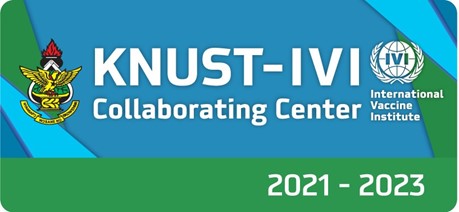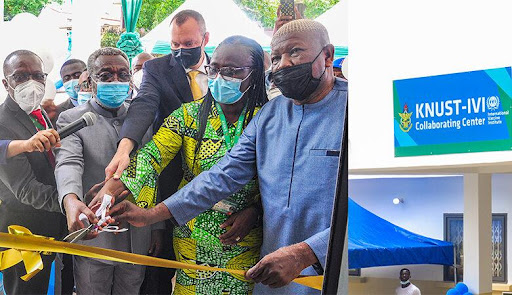KNUST-IVI Collaborating Center

Background
On July 5, 2021, the KNUST-IVI Collaborating Center opened and began operations at KNUST/Agogo Presbyterian Hospital. Watch the opening ceremony here.

- Development and implementation of collaborative projects
- Development and submission of joint proposals for research and/or capacity building programs
- Seconding or exchange of staff members between KNUST and IVI
- Exchange of academic, educational, scientific, and scholarly materials
Collaborative Programs
Typhoid Conjugate Vaccine Introduction in Africa program (THECA)
THECA is a consortium led by the University of Cambridge Department of Medicine and funded by a €13 million Euro grant from the European and Developing Countries Clinical Trials Partnership (EDCTP). THECA includes a cluster-randomized trial in Agogo, Ghana and a mass vaccination campaign in the Democratic Republic of the Congo using the Typbar-TCV (Vi-TT) typhoid conjugate vaccine. From 2019-2023, this project will assess the safety, feasibility and cost-effectiveness of Vi-TT and its ability to limit the spread of antimicrobial resistance.
Typhoid Conjugate Vaccine Effectiveness in Ghana (TyVEGHA)
As part of the THECA program, TyVEGHA is a cluster-randomized, controlled Phase IV trial to assess the effectiveness of Typbar® typhoid conjugate vaccine (TCV) in preventing typhoid infection in children in Asante Akim, Ghana conducted in collaboration with KNUST and other partners. TyVEGHA aims to generate evidence to support critical decision-making for introduction of TCV into routine immunization programs in African countries with endemic typhoid.
Severe Typhoid in Africa (SETA) Plus
SETA Plus is a continuation of IVI’s typhoid surveillance programs in Africa, which began in 2010 with the Typhoid Fever Surveillance in Africa Program (TSAP) and continued from 2015 with the SETA program, a multi-country surveillance study to understand the burden of severe typhoid fever and the associated case fatalities, clinical characteristics, and potential host risk factors that may be related to the disease severity.
SETA Plus will continue to collect standardized data from five sub-Saharan African countries (Ghana, the Democratic Republic of the Congo, Nigeria, Madagascar, and Burkina Faso), including additional information on invasive Salmonella infections, such as severe manifestations of the illness and socio-economic burden.

